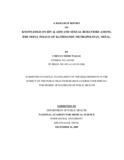Please use this identifier to cite or link to this item:
https://hdl.handle.net/20.500.14356/799| Title: | A research report on knowledge on HIV & AIDS and sexual behaviors among the Nepal police of kathmandu metropolitan, Nepal |
| Authors: | Wagle, Chetan Nidhi |
| Issue Date: | 2009 |
| Keywords: | Nepal Police Knowledge Behavior CSWs Condom |
| Abstract: | Introduction: Nepal Police are in general more vulnerable to HIV/AIDS than their civilian counterparts. Professional characteristics, bereft of the comforts of home, coupled with rigorous service requirements and sexually active age are some circumstances; they may visit sex workers frequently. Proper knowledge about the HIV and AIDS and appropriate implication in the sexual behaviors is the core essence. The study is carried out to probe out the knowledge regarding HIV and AIDS among the Nepal Police and their sexual behaviors. Objectives: To assess the knowledge on HIV & AIDS and sexual behaviors among the Nepal Police of Kathmandu. Methods: Descriptive, cross-sectional type of study was carried out among the 251 policemen from Armed Police Battalion no 1 and Central Police Special Task Force, Naxal, Kathmandu. Sample size was selected using prevalence formula and the respondents were selected purposively from their working area. Self Administered structured closed ended questionnaire has been selected as the tool for the data collection and data was analyzed via windows SPSS 12.0 Results Among the 251 policemen 34.7% belonged to the age group of 20-25 years with mean age of 27.98yrs, 78.8 % married. 100% of them could read and write, 50% were literate in secondary education. 56.6 % were Police Constable, 15.5 % Head Constable, 26.7 % A.S.I. and only 1.2% S.I with mean work experience of 8.47 years. Above average i.e. 73% of them had accurate knowledge about HIV and AIDS. Radio /TV was the major source (59 %). Nine out of 10 were aware about the MOT of the HIV is unsafe sex 93.6 % agreed on the use of the condom and 86.5 % about not having the multiple sex partners as the measure of prevention of HIV transmission. More than half (64 %) hadn’t heard term “window period”. Two-fifth (39%) of them received training on HIV and AIDS. 60.6 % had premarital sex, 52.2 % have multiple sex partners. Prevalence of policemen having sex with CSWs was 77.6% which is seen maximum in the age group of 15-20 years accounting 90 %. 15.9% use to have sex with oral and anal routes too. 13.9 percent of respondents who have the knowledge about the MOT of HIV (unsafe sex) were not applying in the behavior. Almost all (99.2 %) had felt the essence and the need of awareness raising program about HIV and AIDS in Nepal police. Conclusion: With the knowledge score of 7.3 out of 10, the policemen are found to be aware about the MOT, Sign and symptoms and preventive measures about HIV and AIDS. However the simple misconceptions are prevalent as well. At the mean time there is gap in between the knowledge and behavior of use of condom to prevent the HIV transmission. The high prevalence of extramarital, premarital and sexual relation with CSWs can lead to several predictable problems among security personnel. Comprehensive awareness raising programs, training, health education, condom distribution, operational research in relevant field must be launched with in the premises of the Nepal Police. |
| URI: | http://103.69.126.140:8080/handle/20.500.14356/799 |
| Appears in Collections: | Post Graduate Grant (PG) Reports |
Items in DSpace are protected by copyright, with all rights reserved, unless otherwise indicated.

